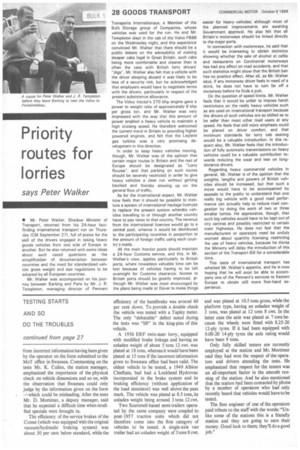Priority routes for lorries
Page 30

If you've noticed an error in this article please click here to report it so we can fix it.
says Peter Walker
• Mr. Peter Walker, Shadow Minister of Transport, returned from his 24-hour factfinding international transport run on Thursday (CM September 271, full of praise for the skill of the drivers engaged in taking heavy goods vehicles from one side of Europe to another. But he also returned with some ideas about such vexed questions as the simplification of documentation between countries and the need for standardized vehicle gross weight and size regulations to be adopted by all European countries.
Mr. Walker was accompanied on his journey between Barking and Paris by Mr. J. R. Templeton, managing director of Pennant Transports Internationaux, a Member of the Bulk Storage group of Companies, whose vehicles was used for the run. He and Mr. Templeton slept in the cab of _the Volvo FB88 on the Wednesday night, and this experience convinced Mr. Walker that there should be a public debate on the advisability of making sleeper cabs legal in Great Britain, such cabs being more comfortable and cleaner than is often the case with British lorry drivers' "digs". Mr. Walker also felt that a vehicle with the driver sleeping aboard it was likely to be less of a security risk, but he acknowledged that employers would have to negotiate terms with the drivers, particularly in respect of the present subsistence allowance.
The Volvo tractor's 270 bhp engine gave a power to weight ratio of approximately 8 bhp per gross ton, and Mr. Walker was very impressed with the way that this amount of power enabled a heavy vehicle to maintain a high cruising speed. He therefore welcomed the current trend in Britain to providing higher powered engines, and felt that the Leyland gas turbine was a very promising development in this direction.
In order to keep heavy vehicles moving, though, Mr. Walker was of the opinion that certain major routes in Britain and the rest of Europe should be designated as "Lorry Routes", and that parking on such routes should be severely restricted in order to give heavy vehicles a clear run without getting baulked and thereby slowing up on the general flow of traffic.
As for the international aspect, Mr. Walker now feels that it should be possible to institute a system of international haulage licences to replace the present system whereby vehicles travelling to or through another country have to pay taxes to that country. The revenue from the international licences would go to a central pool, whence it would be distributed to the participating countries in porportion to the amount of foreign traffic using each country's roads.
All the main frontier posts should maintain a 24-hour Customs service, and this, in Mr. Walker's view, applies particularly to British ports, where nowadays valuable time can be lost because of vehicles having to be left overnight for Customs clearance. Access to British ports should be greatly improved, although Mr. Walker was most encouraged by the plans being made at Dover to make things easier for heavy vehicles; although most of the planned improvements are awaiting Government approval. He also felt that all Britain's motorways should be linked directly to the major ports.
In connection with motorways, he said that it would be interesting to obtain statistics showing whether the sale of alcohol at cafes and restaurants on Continental motorways has had any effect on road accidents, and that such statistics might show that the British ban has no positive effect. After all, as Mr. Walker says, if any motorway driver feels in need of a drink, he does not have to turn far off a motorway before he finds a pub.
On the question of speed limits. Mr. Walker feels that it would be unfair to impose harsh restrictions on the really heavy vehicles such as are used on international transport because the drivers of such vehicles are so skilled as to be safer than most other road users at any speed. He feels that still more emphasis could be placed on driver comfort, and that minimum standards for lorry cab seating would be a valuable introduction. In this respect also, Mr. Walker feels that the introduction of fully automatic transmissions on heavy vehicles could be a valuable contribution towards reducing the wear and tear on longdistance drivers.
Regarding heavy commercial vehicles in general, Mr. Walker is of the opinion that the weights, lengths and powers of British vehicles should be increased, but that such a move would have to be accompanied by appeals to the public to understand that one really big vehicle with a good road performance can actually help to reduce road congestion by doing the work of two or three smaller lorries. He appreciates, though, that such big vehicles would have to be kept out of city centres and possibly restricted to certain main highways. He does not feel that the manufacturers or operators need be unduly worried about quantity licensing restricting the use of heavy vehicles, because he thinks the Ministry will delay the introduction of this section of the Transport Bill for a considerable time.
This taste of international transport has whetted Mr. Walker's appetite, and he is now hoping that he will soon be able to accompany one of the Pennant's services to Eastern Europe to obtain still more first-hand experience.












































































































